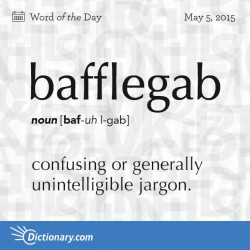 Jargon: Language that is often specific to a certain group or occupation and often not understood by “outsiders.”
Jargon: Language that is often specific to a certain group or occupation and often not understood by “outsiders.”
Slang: Current expressions, intentional misspellings, and other casual words and idioms
Neither slang nor jargon have much of a place in formal writing—especially slang. Judiciously used jargon may have a place.
Jargon: You have heard it.
Businesses use it:
- We need to meet offline about this.
- Our team has to ramp up our efforts.
Education uses it:
- We need to use backwards planning.
- I think we should common core this lesson! (Common Core is the new set of standards. A noun, it is also being used as a verb.)
- You need to scaffold this lesson for some of the students.
Lawyers use it:
You have seen legalese. It tends to be wordy, unclear, convoluted, and to use certain antiquated words like herein.
Doctors use it:
Medical terminology is important and a language of its own. But the general pubic doesn’t understand much of it.
Buzzwords fit into the category of jargon. One of our teachers would lead us in Buzzword Bingo during our staff development days. He would create a buzzword board and hand it out. When we heard each buzzword, we would cross it off. I thought it was a joke until I saw one online today!
Of course acronyms are also jargon and are often overused and used without explanation. We discussed acronyms briefly in last week’s post.
Should we never use jargon? Jargon has its place. First, don’t overuse it. Second, know your audience. If you are writing to a general audience outside of your field, use it very sparingly and always define the terms you use. And always spell out acronyms and abbreviations the first time you use them, putting the acronym in parentheses. If you are writing to colleagues who understand the language, yes, you can use jargon. Well, let me clarify. Obviously, medical terms need to be used if you are writing to others in the field. That is a little bit different in terms of jargon. Something like “Let’s meet offline” should probably be avoided entirely in formal writing and reworded to less “jargonish” speech. How about “Let’s meet as a team later this week to discuss this issue before we announce anything.”
How about in education? Education has lots of buzzwords. Having listened to them, they get tiresome. Limit them!
Slang: Slang is informal. It is conversational at best. Don’t use it in formal writing:
- That is a really cool idea. NO
- What an awesome report that is! NO
- I’m gonna get to that soon. NO
- What’s up? NO
You want to use slang to make a point? Put it in quotes.
Obviously, if you are quoting someone, use the exact words whether the person uses jargon or slang. In quotes, anything is possible!
Enough said about that. We have come to the end of the 7 Deadly Sins of Writing, but I am sure we could think of more! If you have any more, please comment “online or offline”!



Leave a Reply